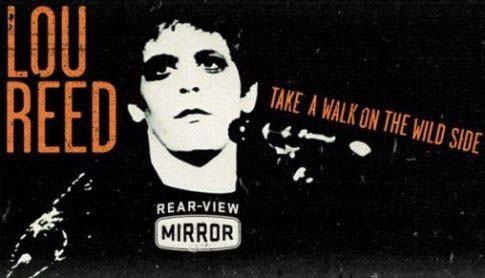Jungian Therapy, Individuation & the Late Lou Reed

Does it seem shocking that a rock musician like the late Lou Reed should be in a post on Jungian therapy and individuation?

Lou Reed passed this week, and he was a very controversial figure — even polarizing. But there is one thing that even his enemies admit: he was an individual.
Reed was born into Long Island suburban respectability. He struggled with 1950s reality, not least of all because the homoerotic dimensions of his character didn’t fit into conventional 50s life. So, it wasn’t long before he found himself in New York City, where he created the avante-garde rock group Velvet Underground and became part of the circle around artist Andy Warhol.
Many of us became aware of Lou Reed in 1972, when he released “Take a Walk on the Wild Side“. Popular culture in North America had never seen the like: a completely unapologetic celebration of gay and transvestite life in New York City. Astoundingly, it became a huge hit. As a Jungian, the powerful attraction of this song for many people who would not even remotely identify with the LGTB communities is striking. Perhaps it stems from the sense of basic acceptance and groundedness that Reed communicates, as if he were saying, “Here I am. This is me. I neither hide, nor sugar coat, nor apologize for who I really am.” His straightforward expression and self acceptance resonated deeply with many who were neither gay nor transvestite, especially younger people.
Reed was a pioneer in opening up issues of gender identity as experienced in our culture. He challenged, and even shocked, in ways that later artists like David Bowie would emulate–in considerably tamer forms. He opened up profound questions about masculine and feminine, the ways in which they relate, and how each of us experiences those realities. He actually touched upon many themes found in Jungian therapy: masculinity and femininity; creativity and receptivity ; sexual and contrasexual. Similarly, he expressed much around shadow: things of which we are barely conscious, or, unconscious; things on the periphery or edges of society, propriety or respectability.
Reed was simple and direct in his art. While seeing himself fully as a serious artist, not an entertainer, or “rock star”, Reed knew that his art was rock, and he was fiercely passionate about attaining his artistic vision. He famously once said “Rock songs should have one chord, maybe two…three and you’re getting into jazz” — but he was a passionate admirer and student of the art of jazz genius Miles Davis, bringing a Davis-like focus to his own work.
Lou Reed was strongly and unabashedly always himself.

To me, his song “Sweet Jane” seems to embody the soul of Lou Reed:
There’s some evil mothersThey’ll just tell you that life’s just made out of dirtThat pretty women, baby, they never really faintAnd that villains always blink their eyesAnd that children are the only ones who blushAnd that life — Life!– that life is just to die… But I want to tell you something:Anyone who ever had a heartOh, they wouldn’t turn around and break itAnd anyone who’s ever played a partThey wouldn’t turn around and hate it…Lou Reed passionately and courageously played the part of himself, and he embodied the self acceptance and journey to the self that Jungian therapy sees as fundamental to individuation.
[cta]

H. @ChocolateVamp
Really love this post–individuation is a huge part of unleashing one’s creativity and expression from the heart and Soul. #gratitude #depthpsychology #individual
Brian C
Thanks very much for your comment, hravenrose! I’m glad that your found the post meaningful. Certainly, allowing one’s creativity and power of expression to surface is a huge element in the individuation process. To really express ourselves in the world, is a key component of the vocation of every individual.
H. @ChocolateVamp
You’re so welcome for the comment~* Appreciate your response!